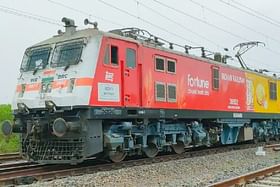GHV-MHK will be setting up an electric locomotive manufacturing unit at Dahod in Gujarat as the joint venture (JV) has emerged as the lowest bidder with over Rs 473 crore quotation in the recently concluded bidding.
GHV MHK JV has quoted Rs 473 crore for design, engineering, procurement, construction, completion, testing and commissioning of electric loco manufacturing unit, offices and administration building with other infrastructure at the Dahod workshop on an engineering, procurement and construction (EPC) mode.
The Dahod factory will be Gujarat’s first and India’s fourth railway manufacturing unit after Chittaranjan Locomotive Works, Banaras Locomotive Works and Patiala Locomotive Works, while two loco factories are operational at Madhepura and Marhora in joint ventures.
Siemens has bagged a contract for the manufacture and maintenance of high horse power 1,200 electric freight locomotives for 35 years at the railway factory at Dahod.
Once the factory is ready, Siemens will be manufacturing high horsepower locomotives at Dahod, which is the main railway station on Delhi-Mumbai route.
Preparatory work for setting up the factory at Dahod is nearing completion. The project envisages installation of heavy machinery and setting up of a car body shell.
The company will also maintain the locomotives at four depots of Indian Railways, namely, Kharagpur, Pune, Visakhapatnam, and Raipur for 35 years using human resources employed by the Indian Railways.
According to the railways, suitable economic drivers will ensure complete indigenisation of the manufacturing, which in turn will lead to the development of ancillary manufacturing units, making it a true ‘Make in India’ initiative.
This project is expected to generate employment opportunities and develop the Dahod region.
The induction of high-horsepower electric locomotives into Indian Railways’ fleet was expected to be used on the Western Dedicated Freight Corridor, to improve the speed of container freight trains by up to 75 kmph in a double-stack configuration.
The locomotive with 9,000 HP capacity will be having a haulage capacity of 4,500 tonnes of load while the maximum speed of these locomotives will be up to 120 km per hour.
The 9,000 HP locomotives will be equipped with an automatic train protection system ‘Kavach’.
The railways expects that the first locomotive will be delivered in early 2024. The locomotive will be manufactured with the use of green energy and will have a green manufacturing tag.


